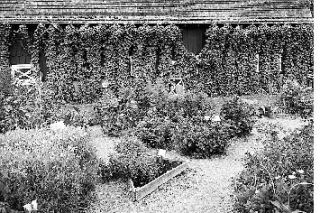For me and for many of my vegetable gardening friends, the Seed Savers Exchange Catalog and the annual Seed Savers Yearbook are favorite sources of heirloom seeds.
Any gardener can purchase seeds from the catalog’s offering of 600 heirloom varieties, selected from more than 25,000 varieties maintained at Heritage Farm. The farm is the home of Seed Savers Exchange. Members of Seed Savers Exchange have access to the 13,571 varieties saved by a dedicated subgroup of Seed Savers Exchange members and listed in the annual Yearbook.
Seed Savers Exchange Heritage Farm is located in Decorah, Iowa, definitely out of the way for northwest gardeners, but to the envy of my friends, my husband Scott and I traveled to Iowa this fall for a Hatch family gathering, and a tour of the farm was on our itinerary.
We met Devin Parker, a staff member, at the visitors’ center and as we toured display gardens and walked trails past preservation gardens planted throughout the rolling hills of this 890-acre farm, we learned about the origin of Seed Savers Exchange and what it does today,35years later.
Diane Ott Whealy and Kent Whealy founded Seed Savers Exchange in 1975, Devin explained as she pointed to deep purple morning glories trellised up and covering the entire wall of the red barn behind Diane’s Garden. The seeds of these Grandpa Ott Morning Glories as well as seeds for German Pink tomatoes were gifts to Diane from her grandfather who brought the seeds with him to Iowa from Germany in 1883 and continued to grow them until the end of his life.
Realizing that this gift captured a piece of their heritage, the Whealys wondered if others had similar experiences and seeds that they would share and exchange. Their first queries in national magazines attracted 29 members by the end of 1975. Today, there are 13,000 members, and the nonprofit Seed Savers Exchange is the largest non-governmental seed bank in the United States.
Our fall visit was a good time to see what seed preservation work looks like. In a walk along the eight miles of trails that wind through the farm, we saw isolation tents that held the remnants of tomatoes, cucumbers and melons. Other widely spaced beds held corn, peppers, eggplant, squash, beans and brassicas.
Back at the farm center, in an enormous hoop house, large fans blew air past pallets holding winter squashes: oblong, round, lumpy and smooth in shades of orange, cream, green, blue and gray. Other stacks of pallets held drying, multi-colored corncobs. Two young women working nearby told us that they and many other staff members would spend the winter cataloging and storing seeds.
As Devin explained while we walked through more gardens, “We grow things out to be sure they are true to type, that they are open-pollinated and not hybrids and that they actually are what we claim in taste, color, character.”
The Seed Savers Exchange Catalog offers an inspiring snapshot of the work we saw at Heritage Farm, but the Seed Savers Yearbook, available to members as part of the forty-dollar annual dues, embodies the spirit of the Whealys’ original vision.
Reading through the listings of seeds saved and offered by 700 member gardeners from Alabama to Wyoming opens a window on gardeners dedicated to maintaining vegetable and fruit varieties for each other and for anyone else who values the preservation of heirloom seeds and the genetic diversity they represent.
This dedication is alive here in the San Juan Islands. Madrona Murphy on Lopez, Rhoda Jones and Alice Swan on Orcas, and Joel Thorson on Waldron all offer seeds in the yearbook. Madrona writes that she’s “researching Native North American crop plants from the Pacific Northwest and B.C. Coast” and lists seeds of asparagus, pea, potato and radish.
Joel Thorson lists seeds of barley, beet, kale, lettuce, parsley, watermelon and wheat and writes that this year he has trialed seven Brune d’Hiver/Brown winter lettuces “in an attempt to find the real Brune d’Hiver no longer available in the commercial trade” and now has “a large supply of seed for the real Brune d’Hiver.”
As they say at Seed Savers: save a seed, save the world.
To learn more about Seed Savers Exchange and to join this valuable organization, visit their website www.seedsavers.org/ and ask at Lopez Library for the DVD “Passing on our Garden Heritage.”



